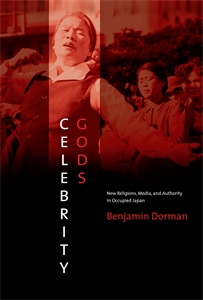Celebrity Gods: New Religions, Media, and Authority in Occupied Japan
On Sale!- About the Book
-
Celebrity Gods explores the interaction of new religions and the media in postwar Japan. It focuses on the leaders and founders (kyōsō) of Jiu and Tenshō Kōtai Jingū Kyō, two new religions of Japan’s immediate postwar period that received substantial press attention. Jiu was linked to the popular prewar group Ōmotokyō, and its activities were based on the millennial visions of its leader, a woman called Jikōson. When Jiu attracted the legendary sumo champion Futabayama to its cause, Jikōson and her activities became a widely-covered cause célèbre in the press. Tenshō Kōtai Jingū Kyō (labeled odoru shūkyō, “the dancing religion,” by the press) was led by a farmer’s wife, Kitamura Sayo. Her uncompromising vision and actions toward creating a new society—one that was far removed from what she described as the “maggot world” of postwar Japan—drew harsh and often mocking criticism from the print media.
Looking back for precursors to the postwar relationship of new religions and media, Benjamin Dorman explores the significant role that the Japanese media traditionally played in defining appropriate and acceptable social behavior, acting at times as mouthpieces for government and religious authorities. Using the cases of Renmonkyō in the Meiji era and Ōmotokyō in the Taishō and Shōwa eras, Dorman shows how accumulated images of new religions in pre-1945 Japan became absorbed into those of the immediate postwar period. Given the lack of formal religious education in Japan, the media played an important role in transmitting notions of acceptable behavior to the public. He goes on to characterize the leaders of these groups as “celebrity gods,” demonstrating that the media, which were generally untrained in religious history or ideas, chose to fashion them as “celebrities” whose antics deserved derision. While the prewar media had presented other kyōsō as the antithesis of decent, moral citizens who stood in opposition to the aims of the state, postwar media reports presented them primarily as unfit for democratic society.
Celebrity Gods delves into an under-studied era of religious history: the Allied Occupation and the postwar period up to the early 1950s. It is an important interdisciplinary work that considers relations between Japanese and Occupation bureaucracies and the groups in question, and uses primary source documents from Occupation archives and interviews with media workers and members of religious groups. For observers of postwar Japan, this research provides a roadmap to help understand issues relating to the Aum Shinrikyō affair of the 1990s.
- About the Author(s)
-
Benjamin Dorman, Author
- Reviews and Endorsements
-
“This is a groundbreaking work that merits reading by all interested in modern Japanese religions, occupation history, and the relationship between media and NRMs in general. It promises to stimulate scholarship in an important yet underresearched field.” – <i>Journal of Japanese Studies</i> (40:1, 2014) <p> “This accessible book will interest scholars generally interested in new religious movements, media studies, and modern Japanese religious history.” -- <i>Nova Religio</i> (14:4, 2014) <p> “<i>Celebrity Gods</i> is a well-researched, neatly written manuscript on the often conflicting relationship between religious freedom, print media and the state in modern Japan.” -- <i>Pacific Affairs</i> (March 2014) <p> “In focusing on major media trends, Dorman uncovers the interplay between external coverage by journalists and internal promotion by the groups’ own writers. The chapters flow logically from pre-war examples of other influential religious organizations through the development, climax, and aftermath of the two groups of focus. Interest in this text will not be confined to scholars of Japanese new religions: the treatment has much to offer researchers of new religions more generally and those interested in the role of media and celebrity in religious institutional development and decline.” -- <i>Religious Studies Review</i> (39:4, 2013)
“Dorman has not only brilliantly illuminated a fascinating era in Japanese religious history, but carefully elucidated the fraught, if symbiotic, relationship between the new religions and the media. His book is an important contribution to the already large shelf of scholarly studies about postwar Japan as well as one of the few the general reader can actually enjoy.” —Japan Times (8 July 2012; read the full review: http://www.japantimes.co.jp/text/fb20120708a2.html)
—https://www.uhawaiipress.com/p-8766-9780824836214.aspx
- Supporting Resources
-










